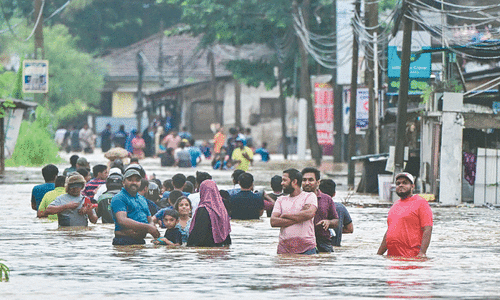
MOGADISHU: Civilians fled their homes in the Somali capital, fearing more clashes over President Mohamed Abdullahi Mohamed’s bid to stay in power, which drew criticism on Tuesday from key political allies.
Mogadishu residents piled televisions and mattresses into rickshaws, or loaded belongings onto donkeys as the city remained on a knife’s edge, with government and opposition troops boosting their military presence in different parts of the capital.
Mogadishu is witnessing its worst political violence in years after February elections were delayed and the president earlier this month extended his mandate for two years.
Months of UN-backed talks failed to overcome the election impasse, and the dispute turned violent on Sunday as forces loyal to the president traded gunfire with fighters allied to his political rivals, leaving at least three dead.
In a blow to the president, best known by his nickname Farmajo, the leaders of two federal states who have until now supported him, rejected the extension of his mandate and called for elections to be held.
Another ally, Prime Minister Mohamed Hussein Roble, welcomed the statement from the states of Galmudug and Hirshabelle and also called for “the acceleration of fair and free elections.” Roble called on military commanders to “get the forces back to their camps” and urged opposition politicians to “stop acts and movements that can create violent conflict.” Alarm is mounting over a splintering of the country’s security forces into rival factions.
The International Crisis Group (ICG) said in a statement that the “immediate trigger” for Sunday’s violence was the influx of army units loyal to one of the opposition presidential candidates, who had abandoned their posts in south-central Hirshabelle — one of the frontlines of the fight against the Al Qaeda linked Al Shabaab.
These troops, who have barricaded roads and deployed trucks mounted with machine guns, were now “in control of sections of the capital”, said the ICG.The UN Mission in Somalia said it was “alarmed” by clan divisions within the Somali National Army and warned the political conflict distracted from the battlefield where Al Shabaab militants are waging a deadly insurgency.
“Use of security forces for pursuit of political objectives is unacceptable,” UNSOM said in a statement.
Since the fighting on Sunday, both sides have built up their presence in the capital, terrifying citizens weary of decades of civil conflict and an Islamist insurgency.
Published in Dawn, April 28th, 2021











































